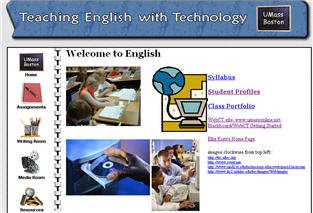Course homepage

Course homepage
Sunday, 17 June 2007
Classroom communities & how to best use a wiki
I liked the idea that Kadjer presented in Chapter 8 about the communities that can be formed through the internet. It seems such a simple idea - use what the kids are already using to promote their academic growth! Wow! So, simple, yet I've never done it. She says that "we strive to create meaningful spaces for student learning," which is absolutely right, but I think I've been trying too hard (98). The wikis and blogs that we've experimented with this week have planted a seed in my head of the possibilities that can arise using the internet. She refers specifically to email in the beginning of her chapter. "E-mail is appealing to students (and teachers) because of its speed, efficiency, ubiquity, and accessibility" (99). Although I personally love the speed of the internet, I still feel that it takes away some of the interpersonal connection that an in class discussion has. Yet, using these programs only reminds me that my students communicate in this form daily. Many of them text each other frequently instead of calling each other (something I hate when people do to me - for example sending me an invitation to go out as a text message instead of calling me directly!). Although I may think that it's impersonal, my students don't. My class needs to be interesting for them, not necessarily for me. If this will keep them engaged then this is what I need to include in my class to be a successful teacher. Which brings me to my reactions to "When Blogging Goes Bad: A Cautionary Tale About Blogs, Email Lists, Discussion, and Interaction". Krause begins by quoting that " "Content Delivery in the 'Blogosphere,'" Richard E. Ferdig and Kaye D. Trammell claim that the benefits of blogs in classrooms include giving students a "legitimate" space to participate in discussions and to share diverse perspectives with readers in and outside of the classroom," - my own initial reaction to what blogging could promote in a classroom. Yet, Krause's article also seems very reasonable. He talks about people feeling disengaged, lack of a dynamic, and lack of participation. I appreciated this article because of its honesty. It presented many of the concerns that I have had in the previous weeks but it also leads me to think that the use of blogs and wikis in a class have their place, as long as they are only a small portion of the class. For example, the professor who came to our lab last week (and I apologize for not referring to her by name), I think had a successful experience with her wiki project because it was simply a project that the class did to help their grade, not a substantial part of the course. If the class really reacts well to the project, then there could be a possibility of expanding its use. Yet, I think the idea behind including these programs in class should be to attempt to talk outside of class, to expand thier use of technology, to add another dynamic to the class, and to provide for mulitple communciation levels. What do you think?
Subscribe to:
Post Comments (Atom)
2 comments:
Ali, I think you make a really good point about using the internet to "promote the academic growth" of your students, but you also touch upon another issue which I find interesting- maybe a 'generational issue'--where one generation sees technology as impersonal and disengaging, and the other sees its use as a normal, efficient, and genuinely appealing way to communicate. I always mimic that cellphone commercial where the mother is upset with her daughter's text messaging. The mother asks, "who are you talking to?" and the girl says, "IDK, MBFF, Jill" I like to use the "TSNF!!" to my kids...Anyways, what I am trying to say is maybe using the computer, internet, cellphones,-anything new- comes so easy to kids, like second nature. I think we as parents/teachers/adults feel apprehensive,nervous, and anxious trying to incorporate technological use in classrooms and at home. Most likely our children/students would enjoy experimenting and using wikis, blogs, and emails alongside their classwork.
When I think back to the teachers who inspired me or made an impression, the one consistency among them was their ability to "teach" so differently, openly, and 'outside the box' compared to all the other classes. These teachers always kept things exciting, interesting, and engaging---something I think these newly-learned technological tools will help us to do in future classrooms.
Communication styles are changing drastically and we all have to face that fact. There is a real impersonal touch to these new styles of communication and how they are threatening old cultural standards. I read an interesting article today in the metro about a new book called The Cult of the Amateur: How Today's Internet is Killing Our Culture by Andrew Keen that examines how the internet is undermining culture. Here is the NPR link to a review of the book.
http://www.npr.org/templates/story/story.php?storyId=11131872
Keen makes some good points and it’s a real interesting interview. It really got me thinking about web 2.0 and the advantages and disadvantages of this new online digital media on the web.
Post a Comment